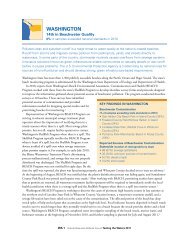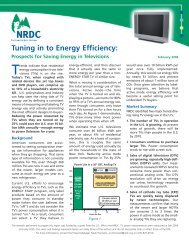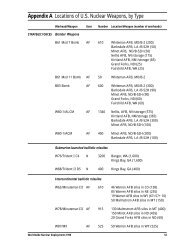US Nuclear Weapons in Europe - Natural Resources Defense Council
US Nuclear Weapons in Europe - Natural Resources Defense Council
US Nuclear Weapons in Europe - Natural Resources Defense Council
You also want an ePaper? Increase the reach of your titles
YUMPU automatically turns print PDFs into web optimized ePapers that Google loves.
U.S. <strong>Nuclear</strong> <strong>Weapons</strong> <strong>in</strong> <strong>Europe</strong> • Hans M. Kristensen/<strong>Natural</strong> <strong>Resources</strong> <strong>Defense</strong> <strong>Council</strong>, 2005<br />
Such nuclear bicker<strong>in</strong>g between U.S. and Russian government officials was common<br />
dur<strong>in</strong>g the Cold War. The fact that it occurs today – nearly three years after the 2001<br />
NPR declared an end to nuclear animosity with Russia and Presidents Bush and Put<strong>in</strong><br />
proclaimed a new partnership between their countries – illustrates the danger of<br />
cont<strong>in</strong>u<strong>in</strong>g the status quo. It shows that the forward deployment of U.S. nuclear weapons<br />
<strong>in</strong> <strong>Europe</strong> is an important irritant to improved relations between Russia and NATO, far<br />
out of proportion to the vague and unspecific benefits these weapons allegedly contribute<br />
to NATO’s security <strong>in</strong>terests.<br />
Clearly there is a need to change the situation. Statements made by U.S. government<br />
officials <strong>in</strong> 2004 and unconfirmed rumors suggest that NATO once aga<strong>in</strong> may be<br />
consider<strong>in</strong>g adjust<strong>in</strong>g the nuclear deployments <strong>in</strong> <strong>Europe</strong>. Such speculations have<br />
occurred before <strong>in</strong> the 1990s and resulted <strong>in</strong> the mistaken estimates about the number of<br />
nuclear weapons deployed <strong>in</strong> <strong>Europe</strong>. This time, however, the <strong>in</strong>dications appear more<br />
explicit and take place <strong>in</strong> the framework of a major U.S. realignment of forwarddeployed<br />
military forces.<br />
The U.S. Congress has authorized a base realignment and closure (BRAC) round <strong>in</strong> 2005.<br />
When order<strong>in</strong>g the military to beg<strong>in</strong> plann<strong>in</strong>g for BRAC 2005, U.S. <strong>Defense</strong> Secretary<br />
Donald Rumsfeld stated that, at a m<strong>in</strong>imum, the process “must elim<strong>in</strong>ate excess physical<br />
capacity; the operation, susta<strong>in</strong>ment, and recapitalization of which diverts scarce<br />
resources from defense capability.” At the same time, the reconfiguration of the<br />
<strong>in</strong>frastructure should maximize war-fight<strong>in</strong>g capability and efficiency. The basis for<br />
BRAC 2005 is a long-term force structure plan developed by the Chairman of the Jo<strong>in</strong>t<br />
Chiefs of Staff for the 20-year period 2005-2025. A BRAC Commission will be<br />
appo<strong>in</strong>ted <strong>in</strong> March 2005 by the president, and <strong>in</strong> May the Secretary of <strong>Defense</strong> will<br />
announce what bases and <strong>in</strong>stallation will be considered for eventual closure. F<strong>in</strong>ally, <strong>in</strong><br />
September 2005, the president will approve (or disapprove) the commission’s<br />
recommendations.<br />
Whether BRAC 2005 will affect the nuclear deployment <strong>in</strong> <strong>Europe</strong> rema<strong>in</strong>s to be seen. A<br />
h<strong>in</strong>t of th<strong>in</strong>gs to come may have been provided <strong>in</strong> March 2004 by General James Jones,<br />
NATO Supreme Allied Commander and Commander of United States <strong>Europe</strong>an<br />
Command. In response to a Belgian Senate committee member’s question about U.S.<br />
nuclear weapons and the risk of an accident on Belgian soil, Jones allegedly stated: “The<br />
reduction will be significant. Good news is on the way.” 209 NATO sources later po<strong>in</strong>ted<br />
out that Jones did not mention nuclear weapons specifically, but the Belgian government<br />
later stated for the record: “…the United States has decided to withdraw part of its<br />
nuclear arsenal deployed <strong>in</strong> <strong>Europe</strong>….” 210 German weekly Der Spiegel followed up by<br />
ask<strong>in</strong>g “whether German nuclear weapons sites will benefit from Gen. Jones’ ‘good<br />
news.’” 211<br />
Accord<strong>in</strong>g to the Los Angeles Times, roughly 200 bases are likely to be closed worldwide<br />
as a result of BRAC 2005, down from 560 to 360 over the next six to eight years. 212<br />
Ironically, part of the guidance provided by the Secretary of <strong>Defense</strong> for overseas<br />
66
















